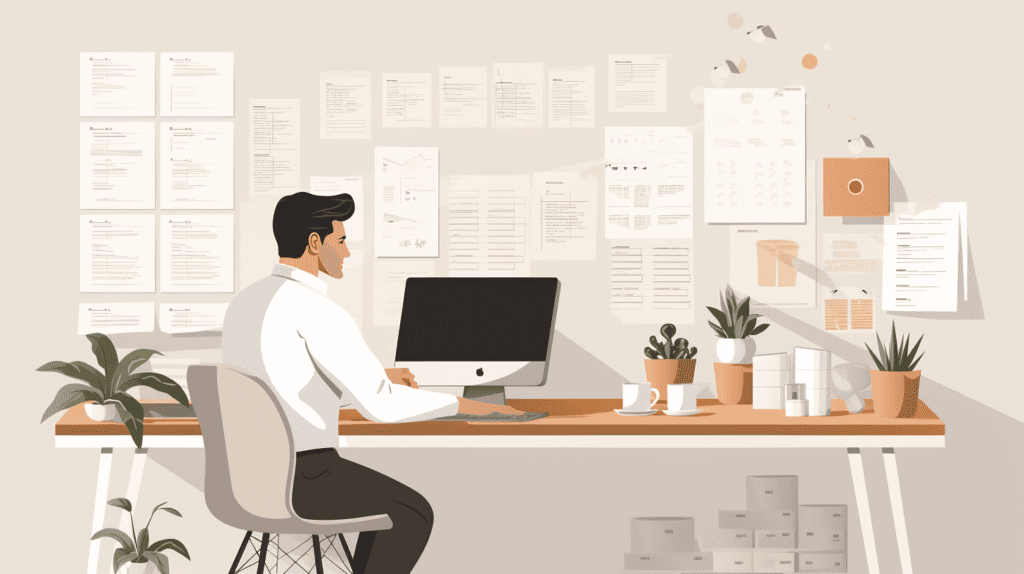Gone are the days when managing our time was just about juggling school assignments and extracurricular activities. As adults, we have a myriad of responsibilities to keep track of, from work deadlines to family commitments and everything in between. That’s why it’s crucial to master the skill of time management. In this article, we will be teaching time management to adults.
Key Takeaways:
- Time management skills are essential for adults in both personal and professional settings.
- Effective time management requires setting goals, prioritizing tasks, and creating schedules.
Why Time Management is Crucial for Adults
As an adult, managing your time effectively is crucial for maintaining a healthy work-life balance and achieving your personal and professional goals. With so many responsibilities to juggle, it can be easy to become overwhelmed and find yourself falling behind on important tasks.
By mastering your time management skills, you can become more productive and efficient, freeing up time to pursue hobbies and spend time with loved ones. Furthermore, effective time management can help reduce stress and improve overall well-being.
However, many adults struggle with managing their time effectively. They may find themselves procrastinating, struggling to prioritize tasks, or becoming easily distracted. Understanding why time management is important and the common challenges that adults face is the first step towards improving your time management skills.
In the next section, we will explore the basics of time management and provide tips and strategies for improving your time management skills.
Understanding the Basics of Time Management
As an adult, managing your time effectively is crucial to achieving your goals and maintaining a healthy work-life balance. To get started, it’s important to understand some basic principles of time management.
Setting goals: Begin by identifying your long-term and short-term goals. This will help you prioritize your tasks and focus on what’s most important. Make sure your goals are specific, measurable, achievable, relevant, and time-bound.
Prioritizing tasks: Once you have identified your goals, prioritize your tasks accordingly. Determine which tasks are most urgent and important, and focus on completing those first. This will help you avoid feeling overwhelmed and ensure you make progress towards your goals.
Creating schedules: To effectively manage your time, it’s important to create a schedule that works for you. This can include assigning specific time slots for different tasks, scheduling breaks, and establishing a routine that aligns with your goals. Be sure to include both work and personal activities in your schedule to maintain a healthy work-life balance.
By understanding these basic principles of time management, you can begin to develop effective techniques to master your schedule and achieve your goals.

Identifying Time Wasters and Eliminating Them
One of the biggest challenges in managing time effectively is dealing with time wasters. These are tasks or activities that consume time without contributing to our goals or priorities. As adults, we often fall prey to these distractions, which can significantly impact our productivity and focus.
To improve your time management skills, you need to become aware of these time wasters and eliminate or minimize them as much as possible. Here are some common time wasters that you need to watch out for:
| Time Wasters | Description |
|---|---|
| Procrastination | The act of delaying tasks or putting them off until the last minute. |
| Distractions | Anything that diverts your attention away from the task at hand. This can include social media, emails, phone calls, or interruptions from coworkers. |
| Multitasking | The act of attempting to do multiple tasks at the same time, which can lead to a decrease in productivity and focus. |
| Perfectionism | The tendency to spend too much time on tasks in an attempt to make them perfect. This can lead to a delay in completing other tasks. |
Once you have identified the time wasters that are affecting your productivity, it’s time to eliminate or minimize them. Here are some tips:
- Set clear priorities. By focusing on the most important tasks first, you can minimize the impact of other distractions.
- Use the Pomodoro technique. This technique involves working in short bursts of focused time, followed by short breaks. It can help you stay focused and avoid multitasking.
- Limit social media and email usage. Set specific times during the day to check your email or social media, rather than constantly checking throughout the day.
- Delegate tasks. Consider delegating tasks that don’t require your direct involvement to others who have the necessary skills and knowledge.
By eliminating time wasters and focusing on the tasks that matter most, you can significantly improve your time management skills and increase your productivity.
Techniques for Prioritizing Tasks
As adults, we often find ourselves juggling multiple tasks and responsibilities. Prioritizing these tasks can help us manage our time more effectively and increase our productivity. Below are some techniques that I have found to be particularly helpful when prioritizing my own tasks:
Eisenhower Matrix
The Eisenhower Matrix is a popular time management tool that can help you prioritize tasks based on their level of importance and urgency. Divide your tasks into four categories:
| Urgent and Important | Important but Not Urgent |
|---|---|
| Complete immediately | Schedule a specific time to complete |
| Not Important but Urgent | Not Important and Not Urgent |
| Delegate to someone else | Eliminate or postpone |
By categorizing your tasks into these four buckets, you can ensure that you are focusing your time and energy on the tasks that require immediate attention while also scheduling time for important tasks that may not be as urgent.

Determine Urgency and Importance
Another effective technique for prioritizing tasks is to determine their level of urgency and importance. Ask yourself:
- Does this task need to be completed immediately or can it wait?
- How important is this task to achieving my goals?
Based on your answers, you can prioritize tasks by scheduling them in order of urgency and importance.
Avoid Multitasking
While it may seem like multitasking can help you get more done in less time, it can actually decrease your productivity and make it more difficult to prioritize tasks. Instead, try focusing on one task at a time until it is completed.
By using these prioritization techniques, you can better manage your time and increase your productivity, helping you to achieve your goals both personally and professionally.
Creating a Productive Daily Routine
Creating a productive daily routine can help you manage your time effectively, achieve your goals, and maintain a healthy work-life balance. Here are some tips to help you create a routine that works for you:
- Set your priorities: Determine your most important tasks and schedule them during your most productive hours.
- Time blocking: Allocate specific time slots for each task and avoid multitasking.
- Schedule breaks: Take regular breaks to recharge your energy and maintain focus.
- Establish boundaries: Avoid distractions by setting boundaries with colleagues, family, and friends during work hours.
- Include exercise and leisure: Schedule time for activities you enjoy and prioritize your physical and mental well-being.
Remember that your routine should be flexible and adaptable to changes in your schedule or priorities. Don’t be afraid to experiment and adjust your routine until you find what works best for you.

Using Technology and Tools for Time Management
Technology has made a significant impact on how we manage our time. With the help of various tools and apps, we can streamline tasks, automate processes, and enhance productivity. Here are some ways technology can assist us in managing our time:
| Tools and Apps | Function |
|---|---|
| Calendar apps (e.g., Google Calendar, Apple Calendar) | Create and manage schedules, set reminders, and share with others |
| Task management apps (e.g., Trello, Asana) | Organize and prioritize tasks, set deadlines, and collaborate with team members |
| Note-taking apps (e.g., Evernote, OneNote) | Capture ideas, create to-do lists, and store important information |
| Focus apps (e.g., Forest, Freedom) | Block distractions, set productivity goals, and track progress |
While technology can be a powerful tool for time management, it’s essential to use it judiciously. Here are some tips to keep in mind:
- Choose tools that align with your needs and goals.
- Avoid using too many apps or tools, as this can lead to overwhelm and distraction.
- Regularly review and assess your use of technology, adjusting as needed.
- Take breaks from screens and technology to avoid burnout and eye strain.
By leveraging technology effectively, we can optimize our time management skills and achieve greater success in our personal and professional lives.
Overcoming Procrastination and Time-Blocking
One of the biggest obstacles to effective time management is procrastination. It can be tempting to put off tasks that seem daunting or unpleasant, but this can lead to a backlog of work and increased stress levels. To combat procrastination, it’s important to break tasks down into smaller, more manageable steps.
One effective technique for managing time is time-blocking. This involves breaking your day into dedicated time slots for different activities. By prioritizing tasks and allocating specific time slots for them, you can ensure that you are making progress towards your goals.
When time-blocking, it’s important to be realistic about the time required for each task. You should also schedule breaks to give yourself time to recharge and prevent burnout.
If you find that procrastination is still getting in the way of your productivity, try setting specific deadlines for yourself or enlisting the help of an accountability partner. By setting external deadlines, you can create a sense of urgency that will motivate you to take action. And by having someone to hold you accountable, you can stay on track and avoid procrastination.

Delegating and Outsourcing for Effective Time Management
As I mentioned earlier, one of the most significant challenges adults face in managing their time efficiently is trying to do everything themselves. Delegating tasks to others can help you focus on high-priority activities and free up time for other essential tasks. It’s essential to understand that delegation doesn’t mean passing off work to others and forgetting about it.
To delegate tasks effectively, you must identify tasks that others can do more efficiently or that you don’t have the expertise to perform. Communicate your expectations clearly, provide the necessary resources, and ensure that the person you delegate the task to understands the requirements. You can use this as an opportunity to develop your leadership and communication skills as well.
Outsourcing is another effective way to manage your time better. It involves hiring someone outside of your organization to perform specific tasks or projects. Outsourcing can be particularly useful if you lack the necessary skills or if the task is time-sensitive and requires quick turnaround times.
Before outsourcing, thoroughly research potential service providers to ensure they have the expertise and reputation to deliver quality work. Clearly define your requirements, set deadlines, and agree on fees upfront. Communication is crucial when outsourcing to ensure that the work is completed to your satisfaction.
Delegating and outsourcing can take some time to master, but they are powerful tools for managing your time more effectively and achieving your goals.
Strategies for Managing Interruptions and Distractions
As adults, we often find ourselves faced with interruptions and distractions that can disrupt our workflow and sabotage our time management efforts. Here are some effective strategies that can help you manage interruptions and distractions:
- Set boundaries: Establish clear boundaries with colleagues, friends, and family members about when you are available to meet or chat. Let them know your work hours and when you need to focus on specific tasks.
- Manage email and notifications: Turn off email and social media notifications during work hours to minimize distractions. Schedule specific times to check email and respond to messages.
- Create a conducive work environment: Find a quiet and comfortable space to work, if possible. Use noise-cancelling headphones or play calming music to block out background noise.
- Practice mindfulness: Take short breaks throughout the day to practice mindfulness or meditation. This can help you stay focused and reduce stress levels.
- Avoid multitasking: Resist the urge to multitask, as it can lead to reduced productivity and increased stress. Instead, focus on one task at a time and complete it before moving on to the next one.
- Create a plan for interruptions: Anticipate potential interruptions and have a plan in place for how to handle them. For example, if you have a meeting scheduled, communicate with colleagues in advance and arrange for someone to cover for you in case of unexpected interruptions.
- Take breaks: It may seem counterintuitive, but taking regular breaks can actually help improve productivity. Take short breaks throughout the day to stretch, take a walk, or just relax.
By implementing these strategies, you can minimize interruptions and distractions, stay focused, and effectively manage your time.
Conclusion on Teaching Time Management To Adults
Mastering time management skills is essential for adults to achieve their personal and professional goals. By understanding the basics of time management, identifying time wasters, and prioritizing tasks, adults can simplify their schedules and focus on what really matters. Creating a productive daily routine and using technology and tools for time management can help maximize productivity and minimize stress. Overcoming procrastination, delegating tasks, and managing interruptions and distractions are vital strategies for effective time management.
Remember, time is a valuable resource, and it’s up to us to use it wisely. With determination and discipline, anyone can learn to manage their time effectively and achieve success. So start implementing these techniques today and watch your productivity soar!
FAQ on Teaching Time Management To Adults
Q: Why is time management crucial for adults?
A: Time management is crucial for adults because it helps them effectively prioritize tasks, increase productivity, reduce stress, and achieve a better work-life balance.
Q: What are the basics of time management?
A: The basics of time management include setting goals, prioritizing tasks, creating schedules, and managing distractions.
Q: How can adults identify and eliminate time wasters?
A: Adults can identify and eliminate time wasters by becoming more aware of how they use their time, setting boundaries, and implementing strategies such as time-blocking.
Q: What techniques can adults use to prioritize tasks?
A: Adults can use techniques like the Eisenhower Matrix to prioritize tasks based on urgency and importance. It’s also important to stay focused and avoid multitasking.
Q: How can adults create a productive daily routine?
A: Adults can create a productive daily routine by time blocking, scheduling breaks, and establishing a healthy work-life balance.
Q: Which technology and tools can adults use for time management?
A: Adults can leverage technology tools and apps like calendar apps, task management software, and productivity trackers to enhance their time management skills.
Q: How can adults overcome procrastination and use time-blocking effectively?
A: To overcome procrastination, adults can break tasks into smaller, manageable parts and allocate dedicated time slots for each activity using time-blocking techniques.
Q: Why is delegating and outsourcing important for effective time management?
A: Delegating and outsourcing tasks allows adults to focus on their core responsibilities and helps them accomplish more in less time. Effective communication and collaboration are key in the delegation process.
Q: What strategies can adults use to manage interruptions and distractions?
A: Adults can manage interruptions and distractions by setting boundaries, managing email and notifications, and creating a conducive work environment.





Leave a Reply